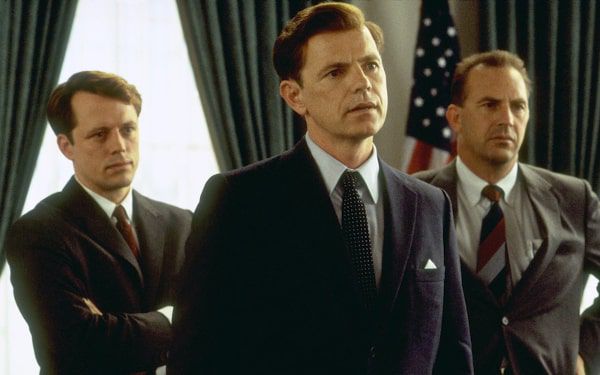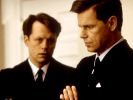Eye For Film >> Movies >> Thirteen Days (2000) Film Review
Thirteen Days
Reviewed by: Angus Wolfe Murray

Everyone remembers where they were during the Cuban Crisis of '62. Nuclear war was about to be declared between the two great powers. An end-of-the-world scenario was being played out at the Kremlin and in the White House.
It hinged, we were led to believe, on whether a Soviet ship, carrying parts for long-range atomic missiles, ignored America's blockade of Cuba. JFK was on the red telephone to Khruschev warning him that if the ship did not stop, the United States would consider this an act of aggression and order a strike on Russia.

Khruschev blinked. The ship turned back. The world was saved and Kennedy became a hero.
According to Thirteen Days, Hollywood's latest rewrite of history, it wasn't like that at all. Everything depended upon whether a man no one knew, who had contacted a journalist with a message from the Kremlin, was genuine. He offered a compromise. The Soviets would dismantle their missiles in Cuba in exchange for a guarantee that America would never invade the island. JFK agreed. Later, Robert Kennedy went to the Russian Embassy in Washington and made a secret deal about taking out obsolete US missiles from Turkey.
It takes a genius to make the Kennedys boring. That man is director Roger Donaldson, ably abetted by co-producer Kevin Costner, who plays Kenny O'Donnell, special assistant to the President.
The body languague is all to pot. Steven Culp has none of Bobby's taut energy. You couldn't imagine him playing touch football, or standing up to a traffic warden, let alone the Teamsters. Bruce Greenwood, as Jack, has no charisma, even less sex appeal and appears confused, rather than decisive.
There is a scene with Jackie (Stephanie Romanov), carrying baby Caroline, outside the Oval Office that would not go amiss in a spoof parody, and is that lugubrious looking bloke in the second row at the bigwig's scrum-down actually LBJ?
Essentially, this is a board-room movie, men in suits sitting around a table, responding to stuff that is happening out there in the big wilderness beyond the White House lawn. The politicians are cautious, the defense chiefs gung-ho.
O'Donnell works the phones and pours the whisky. The dialogue crashes, occasionally.
O'Donnell: "Are you a religious man?"
Airforce pilot: "Yes, sir. I am."
O'Donnell: "Good."
For some reason, certain scenes are in colour, others black-and-white.
Costner makes a poor attempt at a Boston accent and portrays O'Donnell as a workaholic with five kids, an exhausted wife and zero charm. He does get to speak the penultimate lines ("If the sun comes up tomorrow, it is only because of men of good will. That is all there is between us and the Devil"), which gives a flavour of Philip Zelikow's script.
Reviewed on: 23 Mar 2001


















